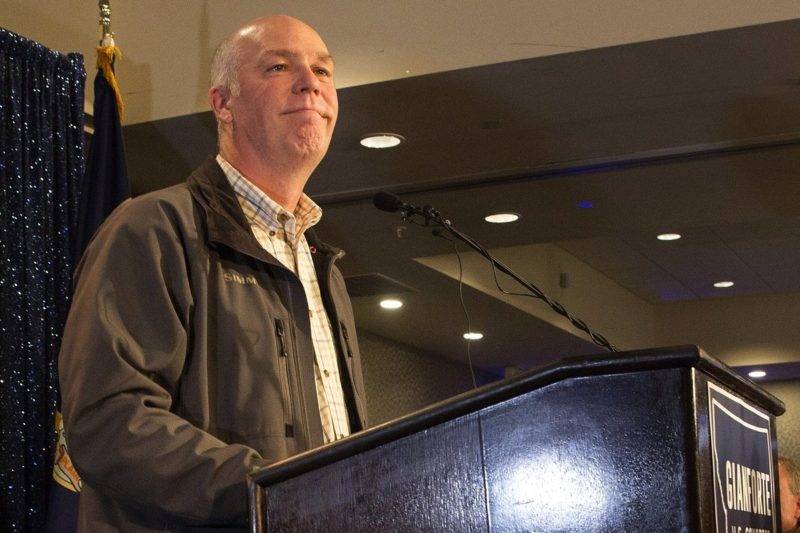Republican Greg Gianforte Wins Montana’s Sole Seat in U.S. House of Representatives
After allegedly assaulting a reporter Wednesday, Gianforte won the race with 50 percent of the vote to Democrat Rob Quist’s 44 percent.

Republican Greg Gianforte won Thursday’s special election to become Montana’s sole representative in the U.S. House, despite facing a citation for the alleged assault of a reporter hours before election day.
Gianforte won the race with 50 percent of the vote to Democrat Rob Quist’s 44 percent. Libertarian Mark Wicks received six percent of the vote.
The terrain shifted Wednesday night, as Guardian reporter Ben Jacobs tweeted that he had been “body slammed” by the Republican candidate before filing a police report that led to Gianforte being cited for misdemeanor assault.
A Fox News reporter who was in the room waiting for an interview described the scene: “Gianforte grabbed Jacobs by the neck with both hands and slammed him into the ground behind him. Faith, Keith and I watched in disbelief as Gianforte then began punching the reporter.”
The incident swamped coverage of the already closely watched race, as cable news outlets, national press, and social media commentary focused on Gianforte’s alleged attack on Jacobs. Jeremy Johnson, professor of political science at Carroll College in Helena, told Rewire that it was an “event without parallel in the day before an election.”
The news of the alleged assault and charge against Gianforte led to three of the state’s largest newspapers, the Billings Gazette, the Missoulian, and the Helena Independent Record to rescind their endorsements of his candidacy.
Once the results were announced, Gianforte appeared before supporters in Bozeman and did offer an apology to Montanans and Jacobs, saying doing so was “the Montana way” according to Politico.
News of the alleged assault and citation came at the end of a race that was, by all accounts, going to be unexpectedly close, but their potential impact was hard to gauge as Montana does not, according to the Missoulian, allow early absentee voters to change their vote, and more than a third of registered voters had already turned in their ballots before Gianforte’s altercation.
Johnson told Rewire that 25 percent to 30 percent of the ballots cast in the special election would come on election day. He noted the race “had tightened in the last couple of weeks, bringing it close to a toss-up.”
Gianforte won 45 of Montana’s 56 counties, winning almost all of the state’s more conservative eastern counties and racking up a large lead in Yellowstone County, the state’s most populous. While Quist outperformed both presidential candidate Hillary Clinton and U.S. House candidate Democrat Denise Juneau’s results from the November 2016 general election, Professor Johnson told the Billings Gazette that Quist underperformed in key swing counties of Cascade and Yellowstone.
Gianforte did lose in his home county, Gallatin, by more than 5,500 votes. He also lost the county during his run for governor in 2016.
According to the Montana Secretary of State’s office, just over 54 percent of the state’s registered voters cast ballots in the election, well under the 74.4 percent turnout of the 2016 election and just under the 55.4 percent for the 2014 mid-term election.
There are lessons for Democrats hoping to turn other Republican-held seats, Chris Koski, professor of political science at Reed College in Portland, Oregon, told Rewire in an email. “Clearly the [GOP] health bill has messed with Republicans enough to suggest that any questions about it are fighting words. Health care issues bring together a number of groups that are otherwise politically separated,” such as the elderly, parents, and those with low incomes.
Koski said the race revealed that focusing on President Trump would be a mistake for Democrats in other states. “I can say that ‘Trump Sucks’ does not work in Trump country. And, so, the Democratic echo chamber might want to figure that out.”
“The investigation into the [Trump administration] seems to have very little to do with the Gianforte-Quist race and, I imagine, it won’t matter much to other rural parts of America,” Koski said.
